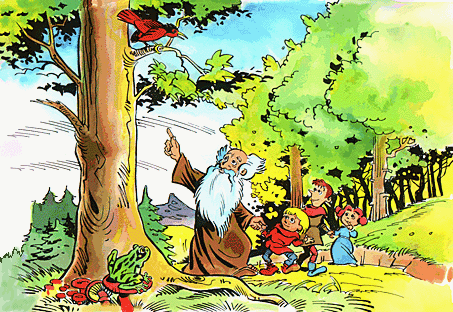-agogic-, -agogue, -agog, -agogic, -agoguery, -agogy
(Greek: usually a suffix meaning: lead, leading, leading forth, guide, guiding; bring, take; promoting, stimulating)
2. One who keeps church relics and presents them to the public: The priest was a mystagogue who had a great collection of church antiquities that were on display in a show case for interested people to view.
Education today, more than ever before, must see clearly the dual objectives: education for living and educating for making a living.

A click on the image will take you to the series of illustrated quizzes which will appear in random order or you may click on this image quiz link.
Leading and teaching children are what a good pedagogue does.
2. A teacher of children: A pedagogue is someone whose occupation is the instruction of children or youths, also called a schoolmaster, and has a negative implication of being very strict and instructs in a dogmatic manner.

Being a pedagogue was and still should be considered an honorable profession!
A pedagogue is now defined as a "schoolteacher, an educator". Originally, it came from Latin paedagogus, a slave who supervised a boy, or boys, including some degree of education. Girls were not a part of the educational system in classical times.
Apparently, the girls were "home-taught" by their mothers or female slaves to be prepared for restricted careers as wives and not for intellectual pursuits as in our modern times.
In wealthier Grecian families, there was at least one slave, especially selected for learning, whose duty it was to take care of the sons of the family during boyhood. One of these duties was to accompany his assigned boys, when they went on the public roads, to and from the gymnasium, or to other places.
Due to the nature of his duties, such a slave was known, in Greek, as a paidagogos, literally a "leader of boys", from pais, "boy", and agogos, "leader".
Sometimes the pedagog was himself a man of high learning, unfortunate enough to have been captured in warfare and subsequently sold as a slave, especially after the Romans defeated the Greeks. In some instances, he also served as a tutor to the boys of the family.
It should be kept in mind that in its original sense, pedagogue did not mean a teacher, but described as the servant who led the well-to-do Greek boy to the gymnasium (school) and then later the "better educated" and captured Greek slave was responsible for the wealthy Roman boys.
Despite the current pejorative senses that have been attached mostly by Americans to pedagogue, pedant, pedantic, and pedantry, such derogatory applications still have not included pedagogik, "of the art of teaching".
Pedophilia originally meant "a love" or "fondness" for children without any sexual deviation applications
Despite the pejorative meaning now applied to pedophilia, etymologically it has had a moral and fully acceptable and positive reference to anyone who loves and cares for children, such as parents, grandparents, teachers, etc.
The more appropriate term for child molesters is paraphilia which is used in psychiatry to mean "sexual deviation" and "sexual perversion", which are two major groups of sexual disorders.
The job of a teacher is to excite in the young a boundless sense of curiosity about life, so that the growing child shall come to apprehend it with an excitement tempered by awe and wonder.


